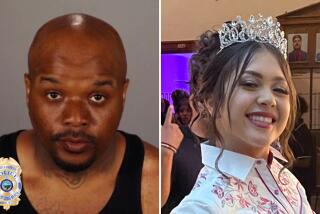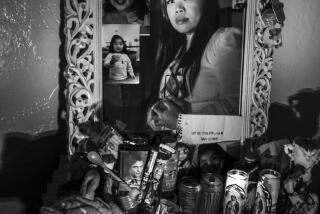Connecticut Teen Sets Up Toll-Free Suicide Hot Line : Survival: Girl, 13, tried to kill herself twice a year ago. She had no one to talk to about her problems, she says; now she wants to offer peers an understanding ear.
- Share via
BETHEL, Conn. — A year ago, Brianna Baylis began having boyfriend trouble. She felt betrayed and decided the quickest way to end the pain would be to end her life.
She was only 12 years old.
Twice she tried to kill herself--the first time by drinking a bottle of a non-prescription medicine, the second by heading out to Interstate 84 to throw herself in front of a car. Another girl screamed and stopped her from walking into traffic.
Brianna said she had no one to talk to at the time. Her best friend, who also had attempted suicide, had been sent away to a special school.
“It’s so important to have somebody to talk with, somebody your own age who understands what you’re feeling,” the 13-year-old said.
Brianna spent two weeks in the hospital and four months in counseling. As part of a class project last spring at Bethel Middle School, where she is in the intellectually gifted program, Brianna decided to try to reach out and help other troubled children.
Her determination paid off: The seventh grader was awarded a $600 grant to set up a toll-free suicide hot line to be operated for and by kids. She hopes to have it running this fall.
“Kids will talk to other kids when they won’t talk to adults, especially if it’s something really personal, like a problem with a boyfriend,” she said in an interview.
The grant came from the Falk Foundation for Excellence in Middlebury, a private foundation that encourages young people to pursue creative ideas.
According to the federal Centers for Disease Control and Prevention, teen-age suicide has increased fivefold over the past 40 years.
In 1990, the most recent year for which figures are available, the national suicide rate for teens was 11.1 per 100,000. In Connecticut, 16 teens took their lives that year, and state health officials believe the number is on the rise.
“It’s hard enough being a teen-ager even if you do have a person you can talk to, and it’s even harder if you don’t,” Brianna wrote in her grant application.
Her peer counseling service will be staffed by youngsters in the 8th through 10th grades from Bethel and neighboring towns. She has already begun contacting principals to find volunteers.
Marc Gershowitz, a Danbury psychologist, has agreed to train the young volunteers. Each will get a special telephone and a list of emergency numbers.
Gershowitz said he will teach listening techniques so the volunteers can help calm upset callers.
“What it’s doing is, it’s reaching a group of adolescents that have gotten so angry and frustrated in their dealings with the world . . . that they’ve pretty much given up that feeling of trust that people with legitimate authority could be of any use to them,” he said.
Brianna’s mother, Jan Baylis, said she is proud that her daughter not only has had the courage to deal with her own problems but wants to help others.
“Life can be very painful for a sensitive teen-ager,” she said. “When I was growing up, suicide wasn’t considered a viable alternative as a way to stop the pain, but things are different now.”
Sherry Earle, who teaches the gifted students at Bethel Middle School, said she, too, is proud that the Falk Foundation chose to fund Brianna’s project.
“Oftentimes kids this age can’t define a plan. The judges felt that she would carry it out,” she said.
More to Read
Sign up for Essential California
The most important California stories and recommendations in your inbox every morning.
You may occasionally receive promotional content from the Los Angeles Times.













